


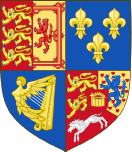
|
1728 |
The English poet and satirist Alexander Pope writes his The Dunciad, attacking the inept poets of the day. His friend, John Gay, takes London by storm with The Beggar's Opera.
The Scottish architect James Gibbs, designer of St. Martin-
|
|
1729 |
The German composer Johann Sebastian Bach (1721 G1) composes his St. Matthew Passion. Apart from sacred music, he wrote fugues, chamber music and orchestral work.
India falls increasingly under the control of the Maratha as the Mughal Empire begins to fall apart. The virtual end comes with the invasion of Nadir Shah, the leader of Iran, in 1739.
|
|
1730 |
Viscount
Townshend, known as "Turnip Townshend”,
retires and, by introducing better methods of farming on his
estate, improves the quantity and quality of his food and
fodder crops - |
|
1731 |
Two French artists, François Boucher and Jean Baptiste Chardin, begin to gain fame in Paris; Boucher as a court painter and Chardin for depicting the life of the petite bourgeoisie.
|
|
1733 |
Following the death of Augustus II, the War of the Polish Succession breaks out, with Russia and Austria supporting Augustus III, and France and Spain Stanislaw Leszczynski.
Settlement begins in Georgia, the last of the thirteen British colonies in North America. This only serves to hasten the outbreak of war between the French and British colonists in 1744.
The English inventor John Kay patents
his "flying shuttle", a device which greatly increases the speed
of hand-
|
|
1734 |
In his Lettres philosophiques the French philosopher Voltaire, regarded by many as the intellectual giant of the century, speaks out fearlessly in favour of the rights of man.
|
|
1735 |
The Treaty of Vienna ends the War of the Polish Succession. A major result is Russia's domination of Poland, a country soon to be swallowed up by its powerful neighbours.
Carolus Linnaeus, classifies plants and animals by a binomial method which names the genus and then the species.
The British painter William Hogarth produces The Rake’s Progress, one of a series of picture dramas which give an insight into the life of his times, and the lessons to be learnt.
|
|
1736 |
The Safavid Empire, attacked earlier by the Afghans, and then invaded by the Russians and Ottoman Turks, finally collapses, and Nadir Shah declares himself the new leader of Iran. XXXXXXXXXXXXXXXXXXXXXXXXXXXXXXXXXXXXXXXXXXXXXXXXXXXXXXXXXXXXXXX The "Porteous Riots" break out in Edinburgh. After the city guard fires on an unruly crowd, killing and wounding many, the guard commander, John Porteous, is hanged by the mob.
|
|
1738 |
Hydrodynamica is published. Produced by the Swiss physicist Daniel Bernoulli, it greatly advances the understanding of fluids, and pioneers work into the kinetic theory of gases.
The artist Antonio Canaletto completes The Upper Reaches of the Grand Canal, one of his many spectacular views of Venice. He visited England and painted scenes of London.
|
|
1739 |
The so-
Nadir Shah of Iran, having taken over power from the Safavids, invades northern India, wins the Battle of Karnal, and sacks Delhi, finally bringing down the great Mughal Empire. India breaks up into warring factions.
After renewed fighting with the Ottomans, by the Treaties of Belgrade, Austria has to give up parts of Romania and Serbia, and all Russian shipping is excluded from the Black Sea.
|
|
1740 |
Following the death of Emperor Charles VI, Frederick II of Prussia invades Silesia and unleashes the War of the Austrian Succession. Many European countries are involved.
The English antiquarian William Stukeley makes a study of Stonehenge and concludes, wrongly, that the stone circle was built by the Druids. He carried out research at Avebury in 1743.
|
|
1742 |
The German composer George
Frederick Handel, famous for his oratorios and Italian-
The Swedish scientist Anders Celsius invents a new temperature scale based on 100 degrees. Named after him, it comes into general use, and is adopted in all scientific work.
|
|
1743 |
A force of British, Hanovarians and Hessians, led by George II, defeats the French at the Battle of Dettingen. However, the War of the Austrian Succession continues unabated.
The first edition of Atlas Generale is published by the French map maker Bourguignon d’Anville. Because of his accuracy, he is regarded as the founder of modern cartography.
|
|
1744 |
As offshoots of the War of the Austrian
Succession, fighting breaks out between British and French
colonists in India and in North America -
|
|
1745 |
In the War of the Austrian Succession, the French defeat the British, Dutch and Hanoverians at the Battle of Fontenoy. In Canada, the British seize the French fort of Louisbourg, but in India they lose Madras to the French.
Bonnie Prince Charlie, grandson of James II, lands in Scotland in July and leads a rebellion against the Crown. He invades England but, lacking support, retreats after reaching Derby.
|
|
1746
1747 |
Following the death of Nadir Shah, Afghanistan is united under Ahmad Shah Durrani. After consolidating his new kingdom, he begins a series of attacks upon India, fighting against the Mughals, Marathas and Sikhs.
The Swiss physician Albrecht von Haller, the founder of neurology, writes his Experiments in the Anatomy of Respiration. He begins his major work on physiology nine years later.
|
|
1748 |
The Treaty
of Aix-
The French jurist Charles Montesquieu completes The Spirit of the Laws, a treatise which stirs up ideas of revolution in France, and later plays a part in the drafting of the constitution of the United States.
|
|
1749 |
Tom Jones, a rattling good story of high spirited adventure, full of humour, comic incident and compassion, is written by the English novelist Henry Fielding.
|
|
1750 |
The London poet Thomas Gray finishes work on his Elegy in a Country Churchyard, a melancholy work of great clarity and simplicity which stresses the transience of life.
Jean Jacques Rousseau, the French philosopher, gains fame with his Discourse on the Influence of Learning and Art. Two of his major works are published in 1762 (G3a).
The French astronomer Nicolas Lacaille leads an expedition to South Africa. Over the next two years he determines the position of some 10,000 stars in the southern hemisphere. |
|
1751 |
A small British garrison, led by the young soldier Robert Clive, withstands the Siege of Arcot and thus gains a major victory over the French in the struggle for power in India.
The French philosopher Denis Diderot, and the mathematician D’Alembert, produce the first volume of the Encyclopédie, a vast work of reference which takes 30 years to complete.
The English landscape gardener “Capability Brown” starts work at Petworth, Sussex. His natural, seemingly unplanned style is soon in demand in estates all over the country.
|
|
1752 |
The Gregorian Calendar, introduced in 1582, is finally adopted by Britain. The necessary adjustment causes riots, with many people demanding to have their eleven days back!
The emperor Ch'ien-
One of the first experiments to investigate the nature of lightning is carried out by the American statesman, inventor and scientist Benjamin Franklin. XXXXXXXXXXXXXXXXXXXXXXXXXXXXXXXXXXXXXXXXXXXXXXXXXXXXXXXXXXXX Species Plantarum, another work by the Swedish botanist Carolus Linnaeus, gives detailed descriptions of some 6000 species and refines the classification system introduced in 1735.
|
|
1754 |
Thomas Chippendale, the English furniture maker, writes The Gentleman and Cabinet Maker’s Director. The first trade journal of its kind, it proves a great success.
The Scottish physician James Lind writes his Treatise of Scurvy in which he advocates the eating of citrus fruit to prevent the disease. The Navy acts on his advice forty years later! |
|
1755 |
The English man of letters Samuel Johnson produces his famous Dictionary. This and later works, including The Lives of the Poets, make him the most famous literary figure of his day.
A massive earthquake hits Lisbon, followed by a huge tidal wave and the outbreak of fire. Much of the city is destroyed and it is estimated that over 30,000 people are killed.
|
|
1756 |
In India, it is alleged that 146 British
captives are imprisoned in a small cell by the ruler of Bengal
and, overnight, 123 die of suffocation in the so-
The Seven Years War begins. Britain allies with Prussia against France, Austria, Russia, Saxony and Sweden. The conflict rages on the continent and in North America and India.
|
|
1757 |
British forces under Clive capture Calcutta and then, against heavy odds, defeat the French at the Battle of Plassey. This victory marks the beginning of the British conquest of India.
|
|
1758 |
|
|
1759 |
Frederick II of Prussia is defeated by the Russians and Austrians at the Battles of Kay and Kunersdorf. The tide begins to turn in favour of his arch enemy, Maria Theresa of Austria.
General Wolfe defeats the French at the Battle of Quebec. This victory, together with the taking of Montreal the following year, paves the way for the British conquest of Canada.
|
|
1760 |
In India, the French defeat at the Battle of Wandiwash and the loss of Pondicherry the following year mark the end of French rule and the beginning of British supremacy.
George II dies at Kensington Palace in October, and is succeeded by his grandson as George III. His reign of sixty years was to witness momentous events and changes.
|






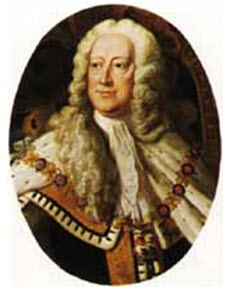
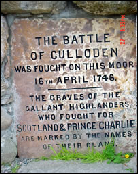
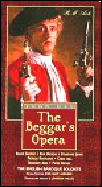


 The
System of Nature
The
System of Nature
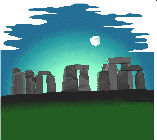 A
Treatise of Human Nature
A
Treatise of Human Nature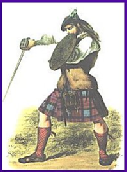 The
Jacobites are defeated at the
The
Jacobites are defeated at the 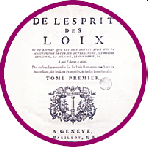 In
Italy excavation begins of the Roman ruins at
In
Italy excavation begins of the Roman ruins at 


 The
comet of 1682 makes its re-
The
comet of 1682 makes its re-